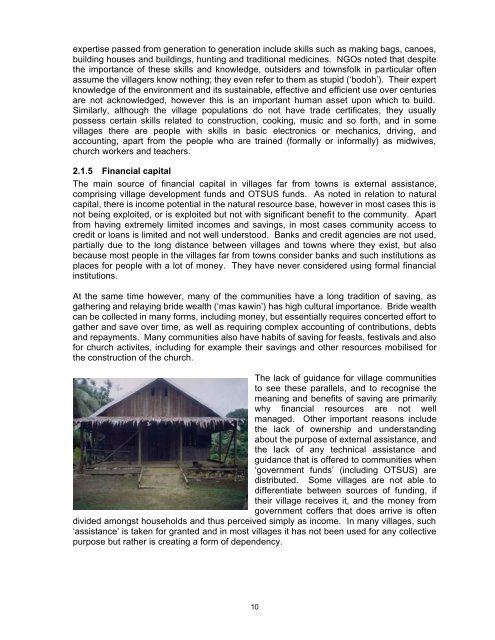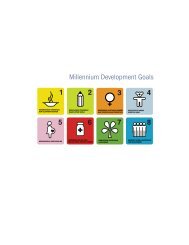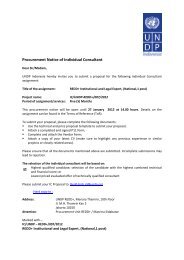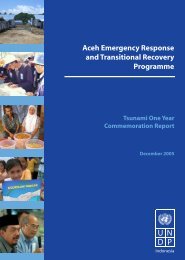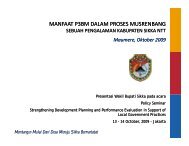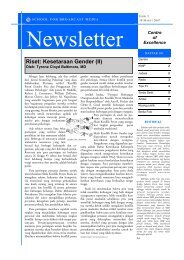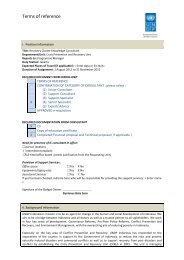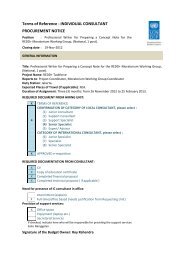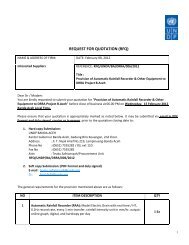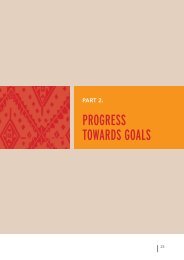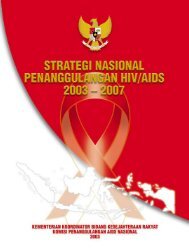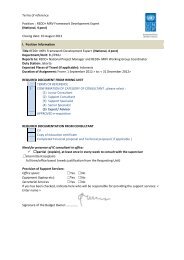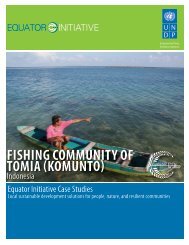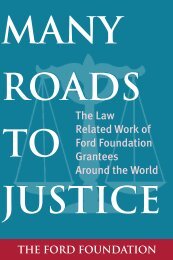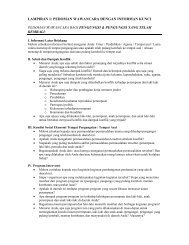Community Livelihoods And Civil Society Organisations In - UNDP
Community Livelihoods And Civil Society Organisations In - UNDP
Community Livelihoods And Civil Society Organisations In - UNDP
You also want an ePaper? Increase the reach of your titles
YUMPU automatically turns print PDFs into web optimized ePapers that Google loves.
expertise passed from generation to generation include skills such as making bags, canoes,<br />
building houses and buildings, hunting and traditional medicines. NGOs noted that despite<br />
the importance of these skills and knowledge, outsiders and townsfolk in particular often<br />
assume the villagers know nothing; they even refer to them as stupid (‘bodoh’). Their expert<br />
knowledge of the environment and its sustainable, effective and efficient use over centuries<br />
are not acknowledged, however this is an important human asset upon which to build.<br />
Similarly, although the village populations do not have trade certificates, they usually<br />
possess certain skills related to construction, cooking, music and so forth, and in some<br />
villages there are people with skills in basic electronics or mechanics, driving, and<br />
accounting, apart from the people who are trained (formally or informally) as midwives,<br />
church workers and teachers.<br />
2.1.5 Financial capital<br />
The main source of financial capital in villages far from towns is external assistance,<br />
comprising village development funds and OTSUS funds. As noted in relation to natural<br />
capital, there is income potential in the natural resource base, however in most cases this is<br />
not being exploited, or is exploited but not with significant benefit to the community. Apart<br />
from having extremely limited incomes and savings, in most cases community access to<br />
credit or loans is limited and not well understood. Banks and credit agencies are not used,<br />
partially due to the long distance between villages and towns where they exist, but also<br />
because most people in the villages far from towns consider banks and such institutions as<br />
places for people with a lot of money. They have never considered using formal financial<br />
institutions.<br />
At the same time however, many of the communities have a long tradition of saving, as<br />
gathering and relaying bride wealth (‘mas kawin’) has high cultural importance. Bride wealth<br />
can be collected in many forms, including money, but essentially requires concerted effort to<br />
gather and save over time, as well as requiring complex accounting of contributions, debts<br />
and repayments. Many communities also have habits of saving for feasts, festivals and also<br />
for church activites, including for example their savings and other resources mobilised for<br />
the construction of the church.<br />
The lack of guidance for village communities<br />
to see these parallels, and to recognise the<br />
meaning and benefits of saving are primarily<br />
why financial resources are not well<br />
managed. Other important reasons include<br />
the lack of ownership and understanding<br />
about the purpose of external assistance, and<br />
the lack of any technical assistance and<br />
guidance that is offered to communities when<br />
‘government funds’ (including OTSUS) are<br />
distributed. Some villages are not able to<br />
differentiate between sources of funding, if<br />
their village receives it, and the money from<br />
government coffers that does arrive is often<br />
divided amongst households and thus perceived simply as income. <strong>In</strong> many villages, such<br />
‘assistance’ is taken for granted and in most villages it has not been used for any collective<br />
purpose but rather is creating a form of dependency.<br />
10


